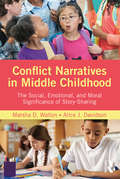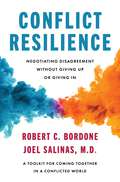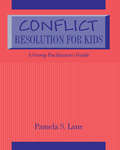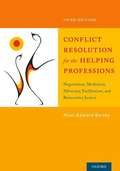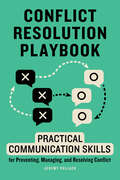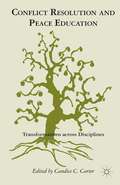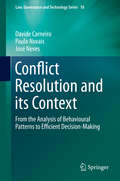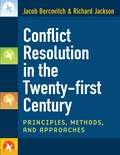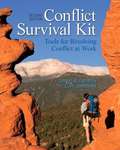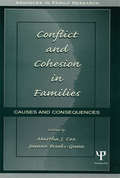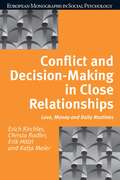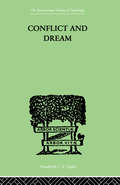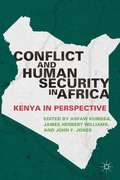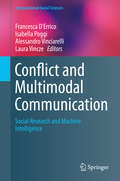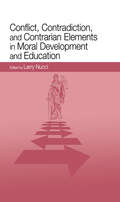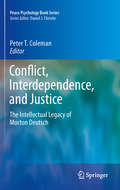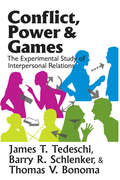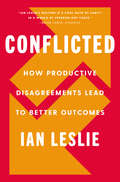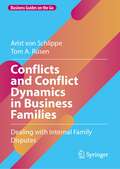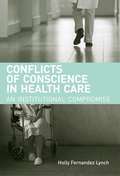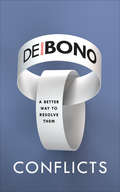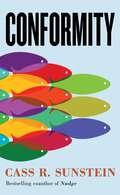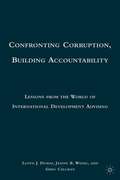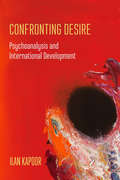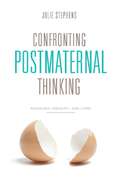- Table View
- List View
Conflict Narratives in Middle Childhood: The Social, Emotional, and Moral Significance of Story-Sharing
by Alice J. Davidson Marsha D. WaltonConflict Narratives in Middle Childhood presents evidence from twenty years of research, examining nearly 3,000 narratives from 1,600 children in eight settings in two countries about their own experiences with interpersonal conflict. Close readings, combined with systematic analysis of dozens of features of the stories reveal that when children are invited to write or talk about their own conflicts, they produce accounts that are often charming and sometimes heartbreaking, and that always bring to light their social, emotional, and moral development. Children’s personal stories about conflict reveal how they create and maintain friendships, how they understand and react to the social aggression that threatens those friendships, and how they understand and cope with physical aggression ranging from the pushing and poking of peers to criminal violence in their neighborhoods or families. Sometimes children describe the efforts of adults to influence their conflicts - efforts they sometimes welcome and sometimes resist. Their stories show them ‘taking on’ gender and other cultural commitments. We are not just watching children become more and more like us as they move through the elementary school years - we are watching them become the architects of a future we will only see to the extent that we understand their way of making sense.
Conflict Resilience: Negotiating Disagreement Without Giving Up or Giving In
by Robert Bordone Joel Salinas M.D.Two former Harvard faculty—one an internationally-recognized negotiator and conflict management expert from Harvard Law, the other a leading behavioral neurologist and cutting-edge scientist from Harvard Med—join forces to introduce conflict resilience: the radical act of sitting in and growing from conflict to break the bad habits that sabotage our politics, workplaces, and most important relationships. Conflict is getting the better of us.From our homes and community centers to C-Suites and Congress, disagreements are happening everywhere, with increasing frequency, and are being treated like zero-sum games that allow little margin for error and even less room for productive conversations. This puts a tremendous and untenable strain on our most important relationships and institutions.Unable or unwilling to negotiate conflict with skill, we ignore it or avoid it for as long as possible; when we are forced to face it, we escalate everyday disagreements and temporary flare-ups as if they’re life-and-death. Neither approach addresses underlying issues, promotes stronger relationships, or yields satisfying results.But there is a solution: a combined skillset and mindset that Bob Bordone calls “conflict resilience”—the ability to sit genuinely with and grow from disagreement. In this powerful, hopeful book, he and renowned neurologist Joel Salinas, MD, combine the inner mechanics of conflict—literally what’s going on in our bodies and our brains during moments of distress—with a groundbreaking three-step framework for how to navigate it:NAME (& dig deep)EXPLORE (& be brave)COMMIT (& own the conflict)In a time of increasing polarization, where consensus, agreement, and problem-solving can sometimes feel elusive, Conflict Resilience provides practical solutions to a common dilemma: How do you handle disagreements and differences with integrity while finding a way to create strong, deep, and lasting relationships?Conflict Resilience is not another book about conflict resolution, nor is it about problem solving. Conflict Resilience combines practical applications of advanced conflict management and study of the human brain to teach anyone how to turn conflict and negotiation into an act of union. This book provides the most cutting-edge and scientifically-grounded tools for driving agreement when possible and for empowering you to disagree better when the differences cut deep and the relationships matter most. This is a chance to bring people together, and an invitation to radically transform how we interact with our friends and families, our co-workers, our students, and our neighbors—anyone with whom we find ourselves in disagreement.
Conflict Resolution For Kids: A Group Facilitator's Guide
by Pamela S. LaneProviding a format for a conflict resolution children's group, this guide is invaluable for the group facilitator - the teacher or counsellor in a school or mental health residential treatment program. It explores theoretical background in facilitating a children's group, and includes numerous activities and concrete tools for implementation of a group process lab. Co-operative learning activities provide task-orientated "ah- ha!" experiences for children working on their interpersonal and problem- solving skills.; Appropriate for use with children in grades K-6, it is also useful as a supplemental textbook in school counsellor education curriculum.
Conflict Resolution For The Helping Professions: Negotiation, Mediation, Advocacy, Facilitation, and Restorative Justice
by Allan Edward BarskyWhen people think of conflict, they often think of fights, wars, arguments, hot tempers, and hurtful consequences. This book provides helping professionals with the theory, strategies, and skills they need to deal with conflict in a manner that is respectful, collaborative, and constructive. This text illustrates how helping professionals can incorporate evidence-based models of conflict resolution to work more effectively and enjoyably with clients, coworkers, supervisors, and others. Practitioners will learn how to respond effectively when others use power, positions, and competition. Whereas many conflict resolution texts focus on one method or approach to practice, this textbook provides practitioners with various models that they can incorporate in their roles as negotiators, counselors, mediators, facilitators, advocates, and peacebuilders.
Conflict Resolution Playbook: Practical Communication Skills for Preventing, Managing, and Resolving Conflict
by Jeremy PollackPractical strategies to manage conflict in both personal and professional relationships Conflict is an unavoidable aspect of human existence, so it's vital to develop communication skills that will help you navigate these challenging moments. With The Conflict Resolution Playbook, you'll discover real-life solutions to everyday problems and develop communication skills that can help you make breakthroughs at work, improve your relationships at home, and lead to significant personal growth. You'll start by learning about conflict and the fundamental communication skills necessary for resolution. Then you can put that knowledge to use with clear-cut strategies for preventing conflicts, resolving them once they start, and dealing with common issues, such as gaslighting and bullying. Along the way, you'll gain a better understanding of conflict itself—where it comes from, why it cuts so deep, and how it can be of value. Improve your communication skills with: Back to the basics—Identify humankind's core psychological needs—identity, safety, care, autonomy, growth, and stimulation—and how they relate to conflict. Real-world advice—Learn to recognize different communication styles, collaborate on solutions, practice assertiveness, and more, through relatable scenarios and actionable strategies. The written word—Discover tips for avoiding or resolving common digital communication issues and boost your text-based communication skills. Learn how to improve your communication skills and develop the tools you need to navigate your way through any conflict.
Conflict Resolution and Peace Education
by Candice C. CarterPeace education includes lessons about conflict sources, transformation and resolution. While featuring field-based examples in multiple disciplines, including political science, anthropology, communication, psychology, sociology, counseling, law and teacher training, this book presents real cases of conflict work. Explained are concepts underlying conflict transformation and strategies that have been adapted for use in professional practice. The contributors describe formal peace education with university students in different fields of study and informal learning of adults in community settings. Comprehensively, this book supports professionals who specialize in conflict work as well as instructors and learners in several disciplines which all respond to conflict.
Conflict Resolution and its Context: From the Analysis of Behavioural Patterns to Efficient Decision-Making (Law, Governance and Technology Series #18)
by Davide Carneiro Paulo Novais José NevesThis book studies how technological solutions can be used to alleviate the current state of legal systems, with their clogged up courtrooms and inefficient conflict resolution methods. It reviews the shortcomings and disadvantages of traditional and alternative conflict resolution methods and turns to Artificial Intelligence for problem-solving techniques and solutions. The book is divided into four parts. The first part presents a general and systematic analysis of the current state of the legal systems, identifying the main problems and their causes It then moves on to present UM Court: a framework for testing and prototyping conflict resolution services. This framework was developed with the objective of using Artificial Intelligence techniques to build a service environment for conflict resolution. The third part of the book takes a step into the future by analyzing the use of Intelligent Environments in the support of conflict management and resolution. It describes the approach taken and the experiments performed in the Intelligent Systems Lab of the University of Minho. The final part of the book contains the conclusions and shows the potential advantages of the use of Intelligent Environments as a way to implement better conflict resolution procedures (virtual or real), in which all the participants have access to more and better information and are able to take better informed decisions.
Conflict Resolution in the Twenty-first Century: Principles, Methods, and Approaches
by Jacob Bercovitch Richard Jackson"An outstanding overview and assessment of contemporary conflict resolution; the authors never avoid the challenging questions, or critical answers. " ---Åshild Kolås, Program Leader, Conflict Resolution and Peacebuilding Program, International Peace Research Institute, Oslo (PRIO) "Conflict Resolution in the Twenty-first Centuryis very readable and crystallizes the breadth of conflict resolution today and the relevance of new approaches for the future. " ---Jeffrey W. Helsing, Deputy Director, Education and Training Center, United States Institute of Peace "This concise and readable volume offers readers an impressive sample of the responses---both traditional and emerging---in the conflict resolution toolbox, crisply outlining how they relate to today's dynamic conflict environment. " ---Chester A. Crocker, James R. Schlesinger Professor of Strategic Studies, Edmund A. Walsh School of Foreign Service, Georgetown University "Authoritative, well written, and astoundingly broad and deep. Must-reading for all students of international and ethnopolitical conflict resolution. " ---Dean G. Pruitt, Distinguished Scholar in Residence, Institute for Conflict Analysis and Resolution, George Mason University "The idea that the nature and methods of conflict resolution ought to change as the kinds of conflict that dominate the world-at-large shift is very appealing. " ---Professor Lawrence Susskind, Director, MIT-Harvard Public Disputes Program "A comprehensive overview, based upon in depth familiarity with the research, scholarship, and practice in the field. " ---Louis Kriesberg, Professor Emeritus of Sociology and Maxwell Professor Emeritus of Social Conflict Studies, Syracuse University In the past, arbitration, direct bargaining, the use of intermediaries, and deference to international institutions were relatively successful tools for managing interstate conflict. In the face of terrorism, intrastate wars, and the multitude of other threats in the post-Cold War era, however, the conflict resolution tool kit must include preventive diplomacy, humanitarian intervention, regional task-sharing, and truth commissions. Here, Jacob Bercovitch and Richard Jackson, two internationally recognized experts, systematically examine each one of these conflict resolution tools and describe how it works and in what conflict situations it is most likely to be effective. Conflict Resolution in the Twenty-first Centuryis not only an essential introduction for students and scholars, it is a must-have guide for the men and women entrusted with creating stability and security in our changing world. Jacob Bercovitch is Professor of International Relations at the University of Canterbury, New Zealand. Richard Jackson is Reader in International Politics at Aberystwyth University, United Kingdom. Cover illustration © iStockphoto. com
Conflict Survival Kit: Tools for Resolving Conflict at Work (Second Edition)
by Daniel B. Griffith Cliff GoodwinTaking a front-line view, The Conflict Survival Kit: Tools for Resolving Conflict at Workfocuses on topics supervisors, team leads and managers need to know to address conflict in organizations. Each chapter succinctly explains conflict theories, frameworks and models, while focusing on important interpersonal and management skills. This classroom text and on-the-job guide presents strategies that can be used immediately in the workplace and provides hands-on practice throughout. Fully updated in this edition, it includes a new section on cultural communication differences, more on mediation, strategies for staying calm during confrontation and a section on managing bullying in the workplace.
Conflict and Cohesion in Families: Causes and Consequences (Advances in Family Research Series)
by Jeanne Brooks-Gunn Martha J. CoxBased on a summer institute of the Family Research Consortium, this book presents theory and research from leading scholars working on issues of risk and resilience in families. Focusing on the splits and bonds that shape children's development, this volume's primary goal is to stimulate theoretical and empirical advances in research on family processes. It will be valuable to developmental, social, and clinical psychologists, sociologists, and family studies specialists.
Conflict and Decision Making in Close Relationships: Love, Money and Daily Routines (European Monographs in Social Psychology)
by Erich Kirchler Christa Rodler Erik Holzl Katja MeierLove and money are important aspects of the everyday lives of couples. This book focuses on the daily routines of disagreement, conflict and joint decisions on these, and other issues such as work, leisure and children, create in the household.Central to the authors' research is a unique diary study of forty couples, who kept a daily record of their joint decisions over the course of a year. The diaries show how challenging, varied and complex the conflicts and decision making of normal everyday life can be and reveal that goals frequently change during the decision-making process with the result that the final outcome often achieves a goal distinct from the original intention. Furthermore, the dynamics of decision making differ according to the problem at stake, the decision-making history of the couple, and the quality of the partnership. The results of the diary study are discussed within the overall context of current research in the field as a whole, including discussion of joint decision-making case studies, close relationships, decision-making research in general and special research methods. Numerous results of psychological, sociological, economic and consumer behaviour studies are summarised and integrated into a model of household decision-making. This book will be primarily of interest to students and researchers in social psychology and economic psychology, but its interdisciplinary and applied nature will also make it of relevance to professionals working in the fields of family therapy and consumer behaviour.
Conflict and Dream
by Rivers, W H RFirst Published in 1999. Routledge is an imprint of Taylor & Francis, an informa company.
Conflict and Human Security in Africa
by Asfaw Kumssa James Herbert Williams John F. JonesThis edited volume looks at human security and conflict in northern Kenya and nearby areas within Sudan, Somalia, Ethiopia, and Uganda. It spells out the precise meaning and nuances of human security in today's global economy and examines the causes and effects of conflict in the region within the context of human security.
Conflict and Multimodal Communication: Social Research and Machine Intelligence (Computational Social Sciences)
by Francesca D'Errico Isabella Poggi Alessandro Vinciarelli Laura VinczeThis book explores the use of technology to detect, predict and understand social cues, in order to analyze and prevent conflict. Traditional human sciences approaches are enriched with the latest developments in Social Signal Processing aimed at an automatic understanding of conflict and negotiation. Communication--both verbal and non-verbal, within the context of a conflict--is studied with the aim of promoting the use of intelligent machines that automatically measure and understand the escalation of conflict, and are able to manage it, in order to support the negotiation process. Particular attention is paid to the integration of human sciences findings with computational approaches, from the application of correct methodologies for the collection of valid data to the development of computational approaches inspired by research on verbal and multimodal communication. In the words of the trade unionist Pierre Carniti, "We should reevaluate conflict, since without conflict there is no social justice. " With this in mind, this volume does not approach conflict simply as an obstacle to be overcome, but as a concept to be fully analyzed. The philosophical, linguistic and psychological aspects of conflict, once understood, can be used to promote conflict management as a means for change and social justice.
Conflict, Contradiction, and Contrarian Elements in Moral Development and Education
by Larry NucciThe premise of this book is that individuals and societies have an inexorable urge to morally develop by challenging the assumptions of the previous generation in terms of what is right and wrong. The focus is on the nature and functional value of conflicts and challenges to the dominant moral and social values framework. Through this analysis, individuals develop moral character through conflict with their local authority figures, including parents. The moral structure of societies evolves through intergenerational challenges to and contradictions with the dominant social order. The book is divided into three parts to help frame this discussion:*Part I directly takes up the issue of resistance as it occurs at a cultural level, and the implications of such resistance for moral education and socialization.*Part II explores the normative forms of adolescent resistance and contrarian behavior that vex parents and teachers alike.*Part III brings back the issue of societal structure and culture to illustrate how negative features of society--such as racial discrimination and economic disparity--can feed into the construction of negative moral identity in youth posing challenges to moral education.Taken together, this collection presents a rich counterpoint to the pictures of moral growth as the progressive sophistication of moral reasoning or the gradual accretion of moral virtues and cultural values. It will benefit those in developmental, social, and cognitive psychology, as well as sociology, political science, and education.
Conflict, Interdependence, and Justice: The Intellectual Legacy of Morton Deutsch (Peace Psychology Book Series)
by Peter T. ColemanMorton Deutsch is considered the founder of modern conflict resolution theory and practice. He has written and researched areas which pioneered current efforts in conflict resolution and diplomacy. This volume showcases six of Deutsch's more notable and influential papers, and include complementary chapters written by other significant contributors working in these areas who can situate the original papers in the context of the existing state of scholarship.
Conflict, Power, and Games: The Experimental Study of Interpersonal Relations
by James T. TedeschiThe technological revolution in the social sciences made available a set of research tools and data manipulation techniques that permit the study of complex social processes previously inaccessible or not amenable to our observational powers. One important set of tools took the generic title "experimental games," which were characterized by the interactive protagonists' pursuit of relatively well-defined goals whose achievement is dependent on the behavior of others. James T. Tedeschi, Barry R. Schlenker, and Thomas V. Bonoma, in this work, explicate these highly structured interactions.The grand strategy of scientific inquiry is the development of explanatory systems for natural phenomena. The empirical tactics devised to manipulate, control, observe, and measure events or processes of interest often require as much ingenuity and imagination as theory development itself. Generally the situation is so structured that certain rules govern participant behavior. Within these constraints the social psychological processes of conflict, influence, power, bargaining, and coalition formation can be studied. Concerned with the more formal and technical aspects of games, the authors explain how they are used for purposes of developing and testing scientific theory. The emphasis throughout is on the development and empirical evaluation of a scientific theory of social influence and power in situations where the interests of the interacting parties are in conflict.Experimental games have provided many of the concepts and the preponderance of evidence that have helped to unravel many of the complexities of social behavior. In Conflict, Power, and Games, the authors build a bridge between technical and non-technical approaches in order to shed greater light on interpersonal relations.
Conflicted: How Productive Disagreements Lead to Better Outcomes
by Ian LeslieDrawing on advice from the world’s leading experts on conflict and communication—from relationship scientists to hostage negotiators to diplomats—Ian Leslie, a columnist for the New Statesman, shows us how to transform the heat of conflict, disagreement and argument into the light of insight, creativity and connection, in a book with vital lessons for the home, workplace, and public arena.For most people, conflict triggers a fight or flight response. Disagreeing productively is a hard skill for which neither evolution or society has equipped us. It’s a skill we urgently need to acquire; otherwise, our increasingly vociferous disagreements are destined to tear us apart. Productive disagreement is a way of thinking, perhaps the best one we have. It makes us smarter and more creative, and it can even bring us closer together. It’s critical to the success of any shared enterprise, from a marriage, to a business, to a democracy. Isn’t it time we gave more thought to how to do it well?In an increasingly polarized world, our only chance for coming together and moving forward is to learn from those who have mastered the art and science of disagreement. In this book, we’ll learn from experts who are highly skilled at getting the most out of highly charged encounters: interrogators, cops, divorce mediators, therapists, diplomats, psychologists. These professionals know how to get something valuable – information, insight, ideas—from the toughest, most antagonistic conversations. They are brilliant communicators: masters at shaping the conversation beneath the conversation. They know how to turn the heat of conflict into the light of creativity, connection, and insight. In this much-need book, Ian Leslie explores what happens to us when we argue, why disagreement makes us stressed, and why we get angry. He explains why we urgently need to transform the way we think about conflict and how having better disagreements can make us more successful. By drawing together the lessons he learns from different experts, he proposes a series of clear principles that we can all use to make our most difficult dialogues more productive—and our increasingly acrimonious world a better place.
Conflicts and Conflict Dynamics in Business Families: Dealing with Internal Family Disputes (Business Guides on the Go)
by Tom A. Rüsen Arist von SchlippeConflicts within the owner circle - or rather, within the "family of the family business" - are often the main cause of existential crises for family businesses. The damaging effects of unchecked family conflicts affect two social systems: the family business and the business family itself. The impairment of the survival capability of the family business goes hand in hand with the reduced chance of constructive follow-up communication between family members. Once caught up in conflict communication, it is extremely difficult for business families to get out of it without the help of external knowledge. It is therefore surprising that the topic of conflict prevention in business families has so far been given relatively little attention. Against this background, this book takes a closer look at the topic of "Conflicts in the Business Family" and deals with a number of topics that are essential to understanding the subject: the specific challenges and conflicts that business families typically face, as well as practically proven methods of conflict resolution at different levels. The content is based on the experiences that the two authors have gained in a variety of research projects, conflict moderation, and family strategic consulting projects over the past 18 years. The key findings from this wealth of experience are now made available to the general public.
Conflicts of Conscience in Health Care: An Institutional Compromise
by Holly Fernandez LynchIn Conflicts of Conscience in Health Care, Holly Fernandez Lynch finds a way around the polarizing rhetoric associated with this issue by proposing a compromise that protects both a patient access to care and a physician's ability to refuse.
Conformity: The Power of Social Influences
by Cass R Sunstein Robert H FrankThe New York Times–bestselling coauthor of Nudge reveals the appeal—and the danger—of conformity: &“Fascinating and surprising revelations.&” —GQ We live in an era of tribalism, polarization, and intense social division—separating people along lines of religion, political conviction, race, ethnicity, and sometimes gender. How did this happen? In Conformity, Cass R. Sunstein argues that the key to making sense of living in this fractured world lies in understanding the idea of conformity—what it is and how it works—as well as the countervailing force of dissent. An understanding of conformity sheds new light on many issues confronting us today: the role of social media, the rise of fake news, the growth of authoritarianism, the success of Donald Trump, the functions of free speech, debates over immigration and the Supreme Court, and much more. Lacking information of our own and seeking the good opinion of others, we often follow the crowd, but Sunstein shows that when individuals suppress their own instincts about what is true and what is right, it can lead to significant social harm. While dissenters tend to be seen as selfish individualists, dissent is actually an important means of correcting the natural human tendency toward conformity and has enormous social benefits in reducing extremism, encouraging critical thinking, and protecting freedom itself. Sunstein concludes that while much of the time it is in the individual&’s interest to follow the crowd, it is in the social interest for individuals to say and do what they think is best. A well-functioning democracy depends on it. &“Eminently relevant . . . a must-read.&” ―Booklist
Confronting Corruption, Building Accountability
by Lloyd J. Dumas Janine R. WedelThe crisis that nearly brought the world's financial house down in 2008 demonstrated clearly that the global economy cannot work where there is widespread deception, corruption and lack of accountability. Corruption and lack of accountability are also key reasons why international development assistance so often fails to deliver on its promise.
Confronting Desire: Psychoanalysis and International Development
by Ilan KapoorBy applying psychoanalytic perspectives to key themes, concepts, and practices underlying the development enterprise, Confronting Desire offers a new way of analyzing the problems, challenges, and potentialities of international development. Ilan Kapoor makes a compelling case for examining development's unconscious desires and in the process inaugurates a new field of study: psychoanalytic development studies.Drawing from the work of Jacques Lacan and Slavoj Žižek, as well as from psychoanalytic postcolonial and feminist scholarship, Kapoor analyzes how development's unconscious desires "speak out," most often in excessive and unpredictable ways that contradict the outwardly rational declarations of its practitioners. He investigates development's many irrationalities—from obsessions about growth and poverty to the perverse seductions of racism and over-consumption. By deploying key psychoanalytic concepts—enjoyment, fantasy, antagonism, fetishism, envy, drive, perversion, and hysteria—Confronting Desire critically analyzes important issues in development—growth, poverty, inequality, participation, consumption, corruption, gender, "race," LGBTQ politics, universality, and revolution. Confronting Desire offers prescriptions for applying psychoanalysis to development theory and practice and demonstrates how psychoanalysis can provide fertile ground for radical politics and the transformation of international development.
Confronting Postmaternal Thinking: Feminism, Memory, and Care
by Julie StephensThere is a deep cultural anxiety around public expressions of maternalism and the application of maternal values to society as a whole. Julie Stephens examines why postmaternal thinking has become so influential in recent decades and why there has been a growing unease with maternal forms of subjectivity and maternalist perspectives. In moving beyond policy definitions, which emphasize the priority given to women's claims as employees over their political claims as mothers, Stephens details an elaborate process of cultural forgetting that has accompanied this repudiation of the maternal.Reclaiming an alternative feminist position through an investigation of oral history, life narratives, Web blogs, and other rich and varied sources, Stephens confronts the core claims of postmaternal thought and challenges dominant representations of feminism as having forgotten motherhood. Deploying the interpretive framework of memory studies, she examines the political structures of forgetting surrounding the maternal and the weakening of nurture and care in the public domain. She views the promotion of an illusory, self-sufficient individualism as a form of social unmothering that is profoundly connected to this ethos. In rejecting both traditional maternalism and the new postmaternalism, Stephens challenges prevailing paradigms and makes way for an alternative feminist maternalism centering on a politics of care.
